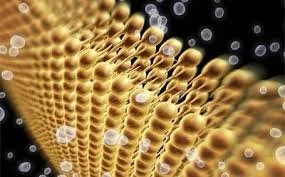I was interviewed by Authority Magazine earlier this month. If you would like to read the full interview, click HERE. If you prefer to read the abridged version, read on. Naturally, I'm responding to the question, what are my '5 Things Everyone Needs to Know About Cancer' from a nutrition perspective.
Healthy Superbowl Recipes
Dietary Guidelines for Americans, 2025-2030 (10th edition)
The USDA released new dietary guidelines recently. And wow, what a striking change from past nutrition guidelines. I was asked to briefly discuss the new guidelines with KTVU Channel 2 on the Sunday morning news. The 2026 food pyramid shifted the focus from “eat low-fat and more carbs” to eating protein and vegetables as the foundation. These guidelines, and particularly, the new upside down pyramid are receiving mixed reviews. Let’s discuss…
Reversing Biological Age: The Nutritional & Lifestyle Blueprint for Longevity
Aging is concomitant with a slew of molecular changes, including significant shifts in the epigenome. While we’re not able to reverse chronological age, it does appear that we CAN reverse our biological age. Biological age is a more accurate measure of how fast your cells, tissues and organs are aging -- think of biological age as a reflection of your overall health and potential longevity.
Healthy Holiday Recipes
Roasted Beet & Persimmon Salad
If you want a festive and beautiful salad that tastes delicious, make this one! It's full of color - red, purple, orange, and green. And you know if it's colorful, it's rich in various protective phytochemicals, including antioxidants - carotenoids, flavonoids, polyphenols, and more.
Some Food Favorites at Costco
It goes without saying that my top favorites at Costco, and all markets for that matter, will be the fresh, organic produce. Frozen too as long as it doesn’t contain added sugars, oils, and chemicals. Costco also has great, organic protein sources, both plant- and animal-based – beans, tofu, chicken, turkey, and wild-caught fish.
What about other products? Well, here are a handful of favorites.
Trader Joe’s – A few favorites!
Nurturing Gratitude to Boost Your Health and Happiness
I think it’s safe to say that our world is experiencing various, and many, challenges. And likely we are too. With Thanksgiving around the corner, we’re reminded of giving thanks. Hopefully, we find ways in our daily lives to feel and express gratitude. Cultivating health and happiness involves a holistic approach that includes taking care of your physical body through balanced diet, regular exercise, and sufficient sleep. It also involves nurturing your mental and emotional well-being through social connections, practicing gratitude, performing acts of kindness, and being mindful of the present moment.
Nutrition for Eye Health
The best nutrition for eye health is a diet rich in antioxidants, carotenoids (especially lutein and zeaxanthin), omega-3 fatty acids, vitamins (A, C, E, B6, folate, niacin), and minerals (zinc, copper, magnesium). High intake of green leafy vegetables (such as spinach, Swiss chard, and kale), colorful fruits and vegetables, cold-water fish (for omega-3s), nuts, and whole grains is associated with reduced risk and slower progression of common eye diseases including age-related macular degeneration (AMD), diabetic retinopathy, cataracts, and glaucoma.
Fall 2025 Recipes - Full of Health, Flavor, & Deliciousness!
Sugar & Glycemic Dysregulation
Americans LOVE sugar – the average sugar consumption in adults in the United States in 2017-2018 was 17 teaspoons daily! Sadly, it’s the same for children too. Sugar is linked to an increased risk of various health conditions, including heart disease, type 2 diabetes, cancer, fatty liver, cellular aging, and more. Sugar increases inflammation, and that may impact your brain, heart, skin, kidneys, liver, and joints. Want to age quickly? Drinking 20 ounces of a sugar-containing soft drink daily equated to 4.6 additional years of aging. Yikes! This premature cellular aging is related to shorter telomere length. What drives a fatty liver? Surprisingly, not fat, but sugar – processed and refined carbohydrates (& alcohol), particularly those rich in fructose. In this study, eighty grams of sugar daily, which is equivalent to about 27 ounces of a normal soft drink, boosts fat production in the liver. And even if no more sugar is consumed, the overactive fat production in the liver continues for a long period of time. If you eat too many refined or simple carbohydrates, you overwhelm the body with sugar.
GLP-1 Foods, Supplements, & Medications – Navigating the Evolving Landscape of GLP-1 Medications
GLP-1 receptor agonists, also known as GLP-1 analogs medications have quickly moved to the front of the room – helping those with obesity, type 2 diabetes, appetite regulation, managing food cravings, and slowing digestion. Is it my ‘go to’? No. Could it be appropriate to consider for some people? Absolutely. Are nutrition and lifestyle modifications still key? You better believe it. If GLP-1 medications are to be considered, think of them more as a tool, not a ‘magic fix’.
Sensational Salads
It’s summer time and the fresh produce is vast and plentiful. Below are five fabulous salads developed by my colleague and friend, Daniela Kratz. Daniela is the founder and creator of Farmhouse Lab. If you love salads and clean salad dressings, you’ll undoubtedly want to follow Farmhouse Lab on Instagramfor more gorgeous and delicious salads. And if you don’t love salads, you will once you see and taste how amazing these salads are. I do so hope you enjoy!
Are you getting the most nutrition from your food?
Should it be raw or cooked? Roasted or sprouted? What about lectins, oxalates, goitrogens, and more?
Simple questions, complex responses. To begin, there are various factors to consider in the raw vs cooked question – digestive tolerance, quantity, and the potential role of anti-nutrients. Some of you may find that you simply tolerate cooked, or slightly cooked foods more easily than raw foods. Generally speaking, the cooking process helps break down the cellular walls of plant foods that allows for easier digestibility. In regards to quantity, think spinach. If you place 20 cups of spinach in a pot and wilt it briefly, it shrinks down to the tiniest amount of spinach. So, cooked spinach will be much higher in nutrients and phytochemicals than raw simply based on volume density.
Berries & Benefits
The entire category is important, including açai, blackberries, blueberries, unsweetened cranberries, goji, raspberries, and strawberries.
Mighty antioxidants, berries help protect against cell damage that both accelerates aging and increases disease susceptibility. They have anticancer, anti-inflammatory, antiulcerative, and antiviral properties. Research shows that berries may inhibit tumor formation in breast, cervical, liver, colon, esophageal, and oral cancers.
Organic Foods – Is the extra cost worth it?
Let's discuss. While we each may have our own (possibly strong) opinion on this topic, my goal is to present what we know from the scientific literature. And I'll be honest, we need more research. That said, independent studies have reported that various pesticides are linked with a host of health problems, including brain and nervous system toxicity, cancer, cardiovascular health, and hormone disruption.
Cancer Survivorship - more complex than often realized
Good news - cancer mortality rates continue to decrease, and cancer survivors are living longer than ever before. That said, we have much more work to do. Cancer incidence is on the rise - it is estimated that there will be over 2 million new cancer cases diagnosed in 2025 and over 600,000 cancer deaths.
I would like to give a special shout-out to all of the cancer survivors out there! Well deserved, you have a day designated to Cancer Survivorship – June 1, 2025. Happy Belated Cancer Survivor’s Day! The NCSD Foundation states that, “National Cancer Survivors Day is a celebration for those who have survived, an inspiration for those recently diagnosed, a gathering of support for families, and an outreach to the community.”
Cherries - packed with nutrition & flavor!
It’s May, the start of cherry season! Brightly colored inside and out, you know that cherries must be full of protective phytochemicals, namely polyphenols. Additionally, they’re loaded with vitamins, minerals, fiber, and prebiotics. Antioxidant-rich in vitamin A, C, and E, this low-histamine fruit has been widely studied for their potential health benefits. Cherries also provide B vitamins, manganese, copper, magnesium, potassium, and vitamin K. These red fruits are rich in phenolic compounds, such as anthocyanins and flavonoids, which have multiple bioactive properties.
Lipids, Cardiovascular Health, & More
Measuring basic lipids, including total cholesterol, LDL calculation, HDL direct, cholesterol to HDL ratio, and triglycerides, is fundamental for assessing cardiovascular health and overall well- being. Yet there is so much more than a basic lipid panel to assess cardiovascular risk. If lipids or cardiovascular risk is a concern, also consider requesting the following labs: apolipoprotein B, hsCRP, homocysteine and a NMR profile assessing the size of the lipoprotein particles.
Healthful & Delicious 'Bowl' Recipes
Can I just say, “Yum!”. I love bowls. They’re a great way to add vegetables, protein, complex carbs, flavors, and all. And so versatile to meet everyone’s needs and palate, so easy to add or omit an ingredient. And the homemade dressings with these bowls take them to the next level. Adjust as you wish and enjoy!




















